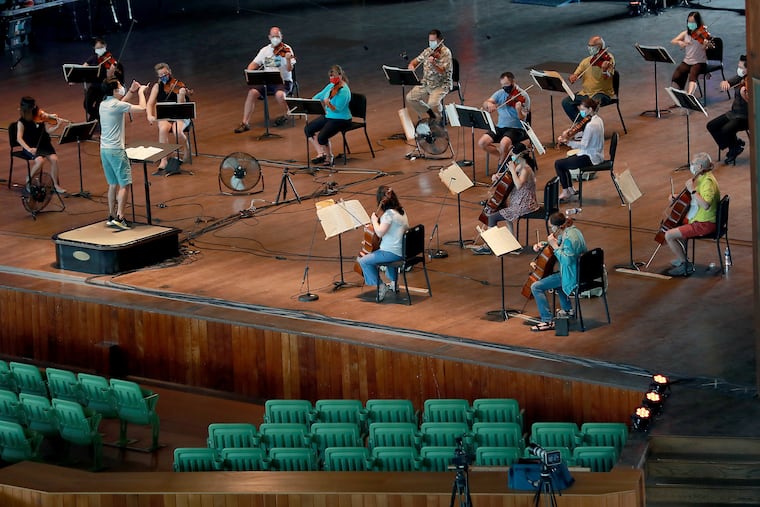The Philadelphia Orchestra goes shorter, smaller and virtual for the first part of the 2020-21 season
“You’re not going to see the Philadelphia Orchestra do Mahler's 5th with full strings and winds and percussion anytime soon," said the orchestra's chief.

The Philadelphia Orchestra is getting back on stage this fall, but it will return as a smaller version of its pre-COVID-19 self and completely online.
The orchestra, known as a big-boned ensemble and often praised for its rich, powerful sound, has plotted out the first four months of the season in repertoire for between just 25 and 50 players. Concerts will be filmed at the Mann Center in September and October, and in Verizon Hall in November and December.
No live audiences will be present. Each program will be streamed online. Opening night is Sept. 30.
“It’s safety first. Period,” said orchestra president and CEO Matías Tarnopolsky of a series of precautions the orchestra has put in place to keep the virus from spreading among musicians.
The new season, announced Monday, is a far cry from the orchestra’s original roster of artists and repertoire for 2020-21, first outlined in March. Concerts will be shorter, about an hour in length, and there are fewer of them — 12 different programs as opposed to the original 21 between opening night and the end of the calendar year.
Regrettably, gone are high-impact statements like the Beethoven Missa solemnis and, with widely adored mezzo Joyce DiDonato, Mahler’s Rückert-Lieder.
The newly configured season, however, does not signal artistic retrenchment. While the repertoire is generous with favorites — a Mozart piano concerto with pianist Emanuel Ax, Vivaldi’s The Four Seasons featuring Gil Shaham as both violinist and conductor — it also retains some notable premieres. Among them are the orchestra’s first-ever performance of the Symphony No. 1 by Florence Price, whose music is receiving a new level of attention, as well as the world premieres of works by Jessica Hunt and Carlos Simon.
The roster of guest conductors and soloists has been significantly altered. Conductors Lahav Shani, Alan Gilbert, and former music director Christoph Eschenbach won’t be appearing this fall. Instead, music director Yannick Nézet-Séguin will be on the podium for seven programs with other concerts led by assistant conductor Erina Yashima and conducting fellow Lina Gonzalez-Granados.
Orchestras all over are navigating the COVID-19 era with varying approaches. The New York Philharmonic has canceled its entire fall season. The Cleveland Orchestra will stream five programs this fall from an audience-free Severance Hall. For the Philadelphia Orchestra, performances will resume, but with a series of protocols in place.
Musicians will have COVID tests before assembling for rehearsals and performances, Tarnopolsky said. Questionnaires, temperature checks, and social distancing will be instituted backstage. Players will perform while remaining six feet apart. Rehearsals and performances will be kept short.
“It’s about layers and layers to ensure that it’s perfectly safe,” Tarnopolsky said.
The size of the ensemble will hew to local regulations for gatherings, he said, meaning it is expected to average around 30 musicians. The orchestra at full steam normally totals about a hundred players, more for some pieces.
Said Tarnopolsky: “You’re not going to see the Philadelphia Orchestra do Mahler’s 5th with full strings and winds and percussion anytime soon.”
Still, the upside is that the pandemic has compelled the orchestra to program works it would not have otherwise explored, he said.
“It’s very exciting to be thinking about repertoire that we don’t think about often,” he said, citing the presence this fall of Mahler’s Symphony No. 4 in its chamber version by Erwin Stein, to be performed here with soprano Jenai Brugger; Stravinsky’s Dumbarton Oaks; and Walker’s Lyric for Strings.
The concert schedule will roughly echo the orchestra’s normal weekly pattern of a new program opening on a Thursday night. Performances will be available for on-demand viewing beginning at 8 p.m. on the broadcast date and will remain available for 72 hours afterwards.
The digital initiative represents an ambitious return for the orchestra. With regular concerts suspended since mid-March, resuming direct contact with listeners and donors through current, fresh performances is critical. Tarnopolsky said, however, that the expected income produced by the digital concerts is “not going to come close to taking the place of ticket revenue in Verizon Hall.”
While normal ticket prices can be as low as $10 for rush tickets or as high as $150 or more for some seats, the price of admission to the digital concert series is modest: $15 for individual concerts, and $39 for a three-concert package.
Subscribers who have already purchased seats for 2020-21 can expect to have those subscriptions automatically moved to the 2021-22 season, a spokesperson said. Alternately, subscribers may request a refund or put a credit toward the purchase of digital concerts this fall.
The plans announced Monday extend only through the end of the calendar year. Not yet clear are any changes in artists, repertoire, venues, or format that may be in store for the rest of the season.
Asked when he thought the orchestra would be able to welcome back a live audience, Tarnopolsky responded with the refrain oft heard in the world of performing arts today: “When there’s a safe vaccine.”
Subscription packages and single tickets to the orchestra’s “digital stage” go on sale Sept. 10 at noon at philorch.org and 215-893-1999.